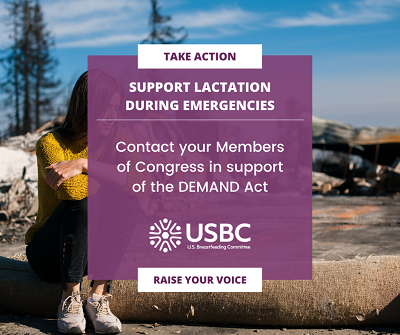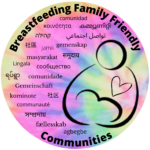Editor’s Note: This post was originally published in August, 2020. It has been updated, September 2022, to reflect current IYCFE information. Resources were updated, October 2024.
Fires! Floods! Unsafe or contaminated water! Hurricanes and Typhoons! Conflicts! War! Pandemics! Crises come in many forms, and these disasters are heavily impacting our families, especially vulnerable families already marginalized or without adequate resources.

The US Breastfeeding Committee reminds us that September is National Preparedness Month and calls us to Take Action on Lactation Support during Emergencies to “ensure that lactation support services and supplies are eligible expenses for emergency assistance through the Federal Emergency Management Agency (FEMA) Critical Needs Assistance program.”
The national focus is critical. Regional, state, and local communities also need information on creating IYCFE-friendly policies and plans in their emergency response plans. How communities prepare for and handle infant feeding during emergencies is crucial to the health and safety of our youngest community members. We know that chest/breastfeeding provides the optimal infant feeding everyday, including in emergencies. Breastfeeding saves lives. It is available! There is nothing to prepare! Nursing does not require clean water or electricity! Human milk contains all the nutrients and fluids that a baby needs, along with antibodies to help fight infection and disease. This is especially important because contaminated water and an unsanitary environment can lead to life-threatening diarrhea and other illnesses! Nursing provides warmth and comfort! Hormones in human milk can help to lower stress levels for both members of the nursing couple.
Often, though, the first thing that governments want to provide…and individual citizens want to donate…is infant formula for families with young childen. Companies that manufacture breast-milk substitutes also are ready to donate infant formula. Governments and individuals may have the best intentions, and it feels good to “do something” so tangible to support babies in times of crises. After all, food is love, right? Well…there are important concerns about communities accepting infant formula donations, “free” formula, and how it is distributed. For instance, the community response may be to distribute the infant formula to all families without first assessing a need. What is the message we are sending to the nursing family? By giving a container of formula, the emergency worker or volunteer is suggesting that the parent cannot successfully nurse during the emergency. In addition, infant formula may be distributed without providing education on safe preparation and storage or access to clean, safe water and the supplies needed to feed the child. Rather than infant formula, nursing families need encouragement and support to continue breastfeeding.
Breastfeeding in emergencies is not easy. However, when communities ensure that equitable protection, promotion, and support for chest/breastfeeding is a part of every emergency preparedness plan, families are more likely to receive the help they need to continue nursing their children despite the obstacles.
What do parents need in an emergency? What does emergency preparedness policy look like for a community? Some key points for a Breastfeeding Family Friendly Community to consider as you prepare to support families during an emergency:
- Create a safe place for infant feeding that keeps families together.
- Reassure nursing parents that continuing to breastfeed is the best choice for feeding their infant and encourage parents to chest/breastfeed as often as the baby wants. It is clean, safe, and readily available.
- Target support to the family’s feeding needs:
- Support breastfeeding families to continue to breastfeed as the safest feeding option;
- Help non-breastfeeding families with safe feeding options, offering infant formula when all other feeding options have been explored and the family can safely prepare the formula and feed the infant;
- Provide nourishment and clean water to the parents to help them stay hydrated and strong to care for their children.
- Do not accept donations of infant formula or distribute formula to all families; purchase ready-to-use formula only as needed and ensure that workers are trained on assessing need.
- Encourage parents who are both breastfeeding and bottle-feeding to increase breastfeeding during the emergency as the clean, safe, and readily-available feeding method.
- Support breastfeeding as the optimal infant feeding method before there is an emergency, and continue to support breastfeeding during emergencies.
- Keep families together. Although it may feel good to feed and comfort a child, emergency workers and volunteers should ensure that families are not separated and provide support to parents so that parents can feed and comfort their children.
Here are some resources to support breastfeeding and infant feeding policies and practices in emergencies:
- 1,000 Days: 5 Things You Need to Know About Breastfeeding in Emergencies
- Centers for Disease Control and Prevention (CDC):
- Emergency Nutrition Network | Infant Feeding in Emergencies (IFE) Core Group:
- Global Breastfeeding Collective: Advocacy Brief Breastfeeding in Emergency Situations
- International Lactation Consultant Association (ILCA):
- La Leche League (LLL):
- La Leche League International Infant Feeding in Emergencies (Multilingual)
- La Leche League GB Breastfeeding in Emergency Situations
- LLL USA Breastfeeding in an Emergency
- Save the Children Infant and Young Child Feeding in Emergencies (IYCF-E) toolkit
- United States Breastfeeding Committee (USBC): Infant and Young Child Feeding in Emergencies
- World Vision: Breastfeeding in Emergencies
